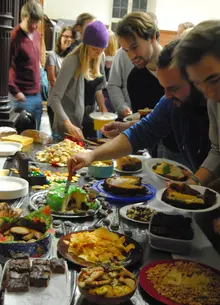Middle Earth in Bamberg
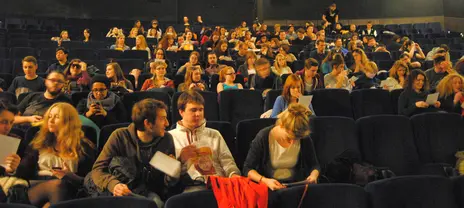
UPDATE: One year later, in December 2014, another trip to Nuremberg's biggest cinema, the Cinecitta, was organised to watch the final instalment of the Hobbit-films, The Hobbit - The Battle of the Five Armies
This time, approximately 60 students joined us for the film and many of them stayed on for dinner and discussion after the film.
In 2015, if possible, a trip to see the latest Star Wars film is planned. If you are interested, please contact Kerstin-Anja Münderlein in October 2015.
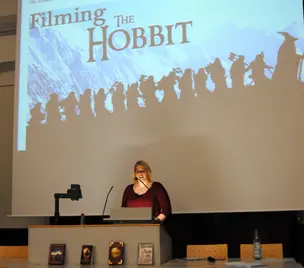
December 2013 brought Middle-Earth to Bamberg as Kerstin-Anja Münderlein organised two Hobbit events, just in time for the release of the second Hobbit film The Desolation of Smaug.
The events were part of the tutorial “Power Structures in Children’s Literature”, but many other dedicated Tolkien fans followed the English Literature Department’s invitation to spend some time in good company, discussing the Hobbit films. The first event dealt with the film The Hobbit – An Unexpected Journey, and took place on the 5th December. It was a lecture and discussion night where Kerstin Münderlein gave us interesting insights into “Filming The Hobbit”. Thus, we learned that most of the additional information that can be seen in the film is taken from the appendix of The Lord of the Rings. The Silmarillion was used for background information as well, and as a source of inspiration as Peter Jackson was not allowed to use it directly. Additionally, the audience learned a lot about the technical details of filming The Hobbit; for example that the elves scenes were shot differently, providing more pictures per minute thus showing how fast they can move.
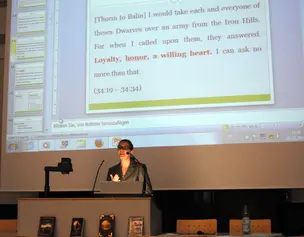
The second lecture “Negotiating Power in The Hobbit” was held by Barbara Kehler and showed impressively that Michel Foucault’s discourse theory is never outdated. We learned for instance that Thorin’s and Bilbo’s relationship is determined by the interrelated discourses of home and family. Additionally, it was showcased that there was a slight shift from the novel to the adaptation. More specifically, in the novel the discourse of riches was the most important one as the dwarves wanted to get back their treasure. However, Peter Jackson altered this in the adaptation, focusing on the discourse of family and home. As a result, without the discourse of riches, the characters are more likeable. Consequently, Thorin Oakenshield, who is rather annoying in the novel, is more endearingly depicted in the adaptation. This is a fact that cannot only be attributed to the charming actor Richard Armitage who embodies Thorin Oakenshield. Thus, the audience learns that discourses influence the everyday behaviour and that, according to discourse, power structures are always in a state of flux.
After the lectures had been finished the ample and impressive buffet was opened. Besides several cakes, a real hobbit hole and the treasure of the dragon could be found. It was a feast!
Thus strengthened, a lively discussion started addressing the shift of power throughout the story.
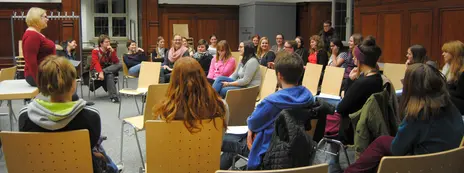
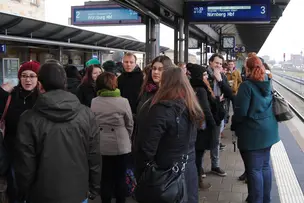
The second event took place on the 13th December, and led many Tolkien fans from the university to Nuremberg to see The Desolation of Smaug in English, shortly after its release. The excitement was already perceptible at the train station. Although we had the chance to visit the Christkindlmarkt, everyone was only talking about The Hobbit, and the tension increased. Finally, the time came to enter the cinema, and as soon as every seat was taken Kerstin Münderlein introduced a competition to us. Everyone who was willing to write an essay about Bilbo’s shifting power position had a chance to win a prize. The winning essays can be found below.
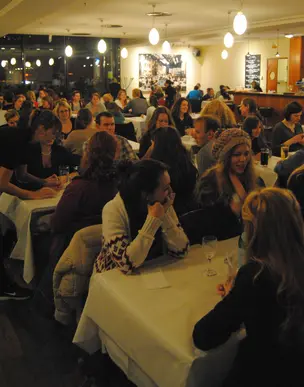
After almost three hours of entertainment, a rather big group of students went to an Italian Restaurant to discuss the film, and the opinions differed. Nevertheless, it was a fantastic trip to Nuremberg and the Hobbit events brought some magic to pre-Christmas Bamberg.
By Freya Wurm
A warm thank you to Lisa Feller, Lisa Kalkowski, Lisa Schädlich, Ulrike Schulz, Freya Wurm and Svenja Zwack for their tireless work and the inmense effort they put into helping us make both events happen!
Please see the full winning essays here:
Tessa Friedrich – 1st prize(414.9 KB, 3 Seiten)
Elke Sichert – 2nd prize(68.8 KB, 2 Seiten)
Tatjana Buchberger– 3rd prize(31.5 KB)

